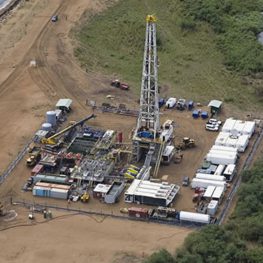Programme Objectives
The objectives of this program are to:
- Graduate qualified technicians who can successfully implement health, safe working practices while carrying out Upstream Maintenance operations.
- Graduate technicians who are able to Operate and maintain Upstream Petroleum Equipment.
- Impart learners with team building knowledge and life skills.
- Pursue lifelong learning through continuing education or postgraduate education (professional meetings, short courses, graduate courses).
- Equip learners with petroleum engineering techniques, skills and knowledge necessary for the oil and gas industry.
- Furnish learners with entrepreneurship and life skills.
Programme Learning Outcomes
Upon successful completion of this programme, the learners must be able to:-
- Work in compliance to Health, Safety and Environment (HSE) practices and standards in the Oil and Gas Industry.
- Be able to troubleshoot and maintain upstream machines in the Oil and Gas sector.
- Function effectively as an individual, and as a member or leader in diverse teams, and in multi-disciplinary settings.
- Identify areas interest in line with career progression.
- Use the techniques, skills, and modern engineering tools necessary for engineering practice.
- Exhibit entrepreneurial skills for self-employment, professional and ethical code of conduct, communication skills, team work and lifelong learning so as to use technology for the progress of society.
Entry Requirements
Considering the technical nature of the programme a learner with science backgrounds shall be eligible for admission on meeting any of the following minimum qualifications:
Category A: Direct Entry: (A’ Level Entry)
The applicant shall have at least one Principal Passes in either Physics or Mathematics.
A subsidiary pass in, Chemistry, Information Technology (ICT), Geography, Technical Drawing and Economics is an added advantage.
Furthermore the candidate must have at least 5 passes at one sitting of O’level in English, Mathematics, Biology, Chemistry and Physics.
Category B: Certificate Entry
Applicants must have attained at least a relevant credit Certificate in any of the following from a recognised institution or its equivalent.
- Electrical and Electronics
- Plumbing
- Machining and Fitting
- Motor Vehicle Technician
Futher more the candidate must have attained at least 3 passes in Mathematics, Chemistry and Physics at one sitting of O’level.
Category C: Mature Age Entry Certificate
Applicants must have passed a mature age entry examination in an engineering discipline from Institutions mandated by NCHE with at least a score of 50%.
Application Procedures
- Through Joint Admissions Board (JAB)
- Direct Application to the Institute, UPIK
Career path
This diploma in Upstream Petroleum Operations (DUPO) curriculum is aimed at producing Upstream Petroleum technicians who are relevant to the industry and world of work. It is learner-centred and competence-based and emphasizes acquisition of skills by the learners through practical teaching and execution of projects.
The competences that the learner is expected to acquire are clearly spelt out in the course units covered in each of the two semesters of an academic year. The course units offered in this course are packaged in a manner that will enable the learner attain particular skills required for performing tasks at any level of the respective academic year of study.
On-Job-Training, which comes at the end of each academic year, is aimed at bridging the gap between institution-based training and the world of work.
Therefore, on successful completion of this program, Candidates can progress and pursue a Bachelor’s degree in the following related disciplines at Universities or other degree awarding Institutions.
- Petroleum Engineering
- Reservoir Engineering
- Petroleum Geoscience
- Petroleum Geophysics
- Petroleum Geology
- Production Engineering
- Mechanical Engineering
- Process Operations Engineering
- Any other related programme
The qualifications provide knowledge and practical skills which exposes its graduates to various employment opportunities not limited to the following:
- Factories
- Petroleum industry
- Building industry
- Private technical work
- Instructing
- Central and Local Government jobs etc.
Other Information
Progression Modalities
These qualifications are aimed at candidates who:
- Intend to follow Apprenticeship and Advanced Modern Apprenticeship programmes
- Wish for career progression within engineering
- Wish to develop the skills learnt from other qualifications
English Language Skills
All assessment shall be conducted in English “unless on request”. Candidates should have the ability to deal in a general way with new or non-routine information. They should be able to understand the main points of inputs on familiar matters regularly encountered in the workplace. They should also have the ability to produce simple written and spoken responses on topics that are familiar.
Learning and Teaching Environment
It is expected that the setting for delivery and assessment of this Training Standards will take place in a training workshop which will match as closely as possible to workplace maintenance workshops.
The use of case studies and practical activities should be used to illustrate the key learning points.
It is strongly recommended that the Techniques and Practice Standards are delivered in conjunction as they have been designed to be complementary. Some assessment could also be integrated.
For the Maintenance Techniques Training Standards, Candidates will develop an understanding of the function, operation and routine maintenance requirements associated with the various equipment types. Some of the learning activity will take part in a classroom setting, to cover theory requirements and assessments for these Standards will be closed book and supervised. Assessment will typically consist of structured written questions and oral questions, for which records must be maintained.
For the Maintenance Practice Training Standards, emphasis is placed on developing the skills required to conduct routine maintenance of the various equipment types. Candidates are expected to work in accordance with safe working practices and they will learn how to prepare for maintenance activities, identify hazards, use technical guidelines, prepare maintenance records and clean the work area afterwards. The delivery and assessment of these standards should take place in a realistic workshop setting and observation checklists should match as closely as possible to actual workplace operational requirements, procedures and practices.
Start your career in Upstream Petroleum Operation today!
ENROLL NOW




